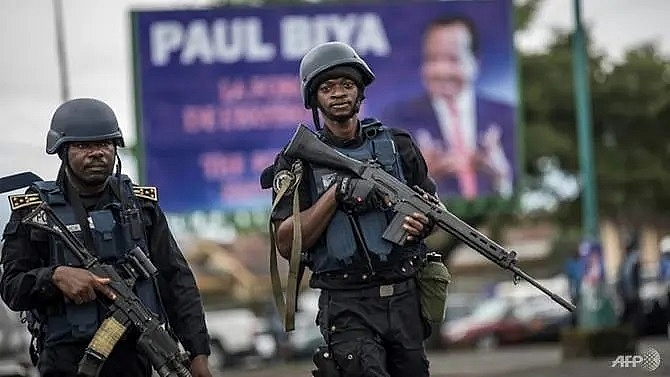Cameroon crisis risks spiralling out of control: UN aid chief
 |
| Separatists have launched an armed campaign in Cameroon's two anglophone regions and the government has responded with a crackdown. (AFP/MARCO LONGARI) |
At least 4.3 million people are in need of aid - a 30 per cent increase from last year in what Mark Lowcock described as an "under-reported" crisis in the central African country.
Cameroon is wracked by a conflict between separatists and government forces in its English-speaking west, combined with an influx of refugees from the Central African Republic and Nigeria.
"Both the humanitarian and the security situation continue to deteriorate and run the risk of spiraling out of control," Lowcock, the under-secretary-general for humanitarian affairs, told the council.
"The level of the crisis today is more alarming than ever."
More than 560,000 people have been driven from their homes since 2017 including 32,000 who have fled to Nigeria. The violence from the Boko Haram insurgency in Nigeria has spilled over to Cameroon.
The United States, joined by Germany, Britain and the Dominican Republic, organized the meeting on Cameroon, but African countries made clear they were skeptical of the new focus.
Equatorial Guinea's Ambassador Anatolio Ndong Mba, speaking on behalf of the three African countries on the council, warned that the humanitarian crisis should not be "politicised".
The crisis is not a threat to international peace and "the situation should therefore be tackled by the government of Cameroon with genuine support from the international community," said Mba.
China and Russia also warned against UN meddling in Cameroon's affairs.
NEGLECTED CRISIS
Rights groups have accused the United Nations of ignoring the conflict in Cameroon, where separatists in English-speaking regions are pushing for independence from the majority French-speaking country.
The government has responded with a crackdown, deploying thousands of soldiers.
More than 200 members of the security forces and at least 500 civilians have been killed, according to figures from the International Crisis Group, a think-tank.
Cameroon's Ambassador Michel Tommo Monthe defended his government's handling of the conflict, saying Yaounde was "facing secessionism, facing terrorism" but was "on its feet, standing tall."
Cameroon's Prime Minster Joseph Dion Ngute traveled to the anglophone region last week, offering dialogue but making clear that independence was not an option.
Jan Egeland, head of the Norwegian Refugee Council and a former UN aid chief, said the crisis in the English-speaking part of Cameroon was "one of the world's most neglected".
"The lack of information and international political attention has allowed the situation to deteriorate from peaceful demonstrations to the atrocities committed by both sides," he told the council.
Egeland called for scaling up diplomatic efforts to prevent the violence from worsening and a "massive injection" of funds to support relief work.
What the stars mean:
★ Poor ★ ★ Promising ★★★ Good ★★★★ Very good ★★★★★ Exceptional
 Tag:
Tag:
Related Contents
Latest News
More News
- Russian President congratulates Vietnamese Party leader during phone talks (January 25, 2026 | 09:58)
- Worldwide congratulations underscore confidence in Vietnam’s 14th Party Congress (January 23, 2026 | 09:02)
- Political parties, organisations, int’l friends send congratulations to 14th National Party Congress (January 22, 2026 | 09:33)
- 14th National Party Congress: Japanese media highlight Vietnam’s growth targets (January 21, 2026 | 09:46)
- 14th National Party Congress: Driving force for Vietnam to continue renewal, innovation, breakthroughs (January 21, 2026 | 09:42)
- Vietnam remains spiritual support for progressive forces: Colombian party leader (January 21, 2026 | 08:00)
- Int'l media provides large coverage of 14th National Party Congress's first working day (January 20, 2026 | 09:09)
- Vietnamese firms win top honours at ASEAN Digital Awards (January 16, 2026 | 16:45)
- ASEAN Digital Ministers' Meeting opens in Hanoi (January 15, 2026 | 15:33)
- ASEAN economies move up the global chip value chain (December 09, 2025 | 13:32)






















 Mobile Version
Mobile Version